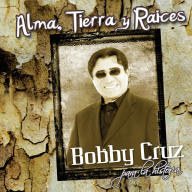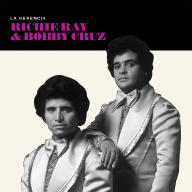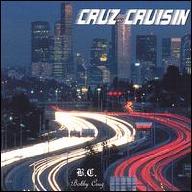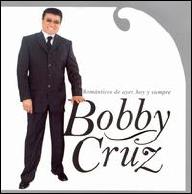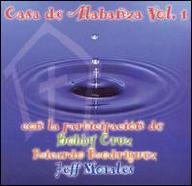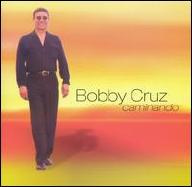Born on February 2, 1938, in Hormigueros, Puerto Rico, Roberto Cruz Feliciano grew up on a farm in the countryside. His prime musical influence was El Gran Combo. After moving with his family to New York City, he met and befriended pianist Ricardo Richie Ray, whose orchestra he joined as a vocalist. Both Cruz and Ray made their recording debuts on Ricardo Ray Arrives/Comején (1964), billed to the Ricardo Ray Orchestra and released by Fonseca Records. Boasting a memorable hit with Comején and a song that would be reworked in later years, Mambo Jazz, the album featured a variety of musical styles (mambo, descarga, bolero, pachanga, cha cha) and was arranged entirely by Ray and Cruz. On the Scene with Ricardo Ray (1965) followed on Fonseca, along with a few other albums whose exact release dates are questionable: 3 Dimensions (1966), Richie Ray Introducing Bobby Cruz a Go-Go-Go (1966), and Fiesta Navideña (1966).
Ray and Cruz then switched to Alegre Records for another run of albums, initially billed to simply Ricardo Ray and beginning with Se Soltó/On the Loose (1966), which notably features a pioneering boogaloo effort, Danzón Boogaloo. Jala Jala y Boogaloo (1967) kept the boogaloo vibe going, as did its sequel, Jala Jala y Boogaloo, Vol. 2 (1968), the latter featuring the English-language hit Mr. Trumpet Man with Cruz on lead vocals. The duo released several further albums on Alegre, including Let's Get Down to the Real Nitty Gritty (1968), Los Durísimos/The Strong Ones (1969), and Agúzate (1970), the last few co-billed to Ricardo Ray Bobby Cruz, and also recorded sparingly for Tico and United Artists.
In 1970, Ray and Cruz moved to Puerto Rico, where they opened a club, Richie Ray's Club in Rio Piedras, and began recording for Vaya Records, a subsidiary of Fania Records. Their Vaya debut, El Bestial Sonido de Richie Ray y Bobby Cruz (1971), marks the beginning of their salsa phase and is one of their best albums overall. During this period, Cruz made his solo debut with Bobby Cruz Canta para Ti (1972), produced by Ray. The duo was at the height of its popularity during the early to mid-'70s and performed frequently. Their 1972 in-concert album Jammin' Live perhaps the pinnacle of their popularity, and they're also heard on the classic Fania All-Stars albums Live at the Cheetah, Vol. 1 (1971), Our Latin Thing (Nuestra Costa) (1972), Live at the Cheetah, Vol. 2 (1973), Latin-Soul-Rock (1974), Live at Yankee Stadium, Vol. 1 (1976), and Live at Yankee Stadium, Vol. 2 (1976).
In 1974, during a concert at Roberto Clemente Coliseum in San Juan, Puerto Rico, Ray and Cruz were declared Los Reyes de la Salsa (the Kings of Salsa), and in the aftermath of this honor, Ray and, shortly thereafter, Cruz made a very public conversion to to Christianity, closing their club, changing their lifestyles, and going on to become pastors. Their conversion to Christianity didn't affect their music right away, for they continued recording albums on Vaya Records throughout the '70s and into the '80s, namely Amor en la Escuela (a Cruz solo album; 1974), 1975 (1975), 10 Aniversario (1975), Reconstrucción (1976), The Best of Richie Ray Bobby Cruz (1977), Viven (1977), El Sonido de la Bestia (1980), De Nuevo los Durísimos (1980), Pinturas (1981), Las Aguilas (1982), and Back to Back (1982). Then, after a five-year hiatus, they released their final Vaya album, Los Inconfundibles (1987), which notably includes their swan song, Adiós a la Salsa. They effectively disappeared from the music scene for over a decade, focusing their efforts instead on church-related activities.
In 1997, Cruz published the book -Cuando Era Niño, a memoir of his childhood; an accompanying album was released by RMM Records as well that year. In 1999, Ray and Cruz reunited for a concert at Ruben Rodríguez Coliseum in Bayamón, Puerto Rico. Following this one-off concert, the duo performed a series of shows in Venezuela, Columbia, Mexico, New York, and Miami. A warmly received double-disc in-concert album documenting the duo's reunion, Un Sonido Bestial el Concierto (1999), was released by Universal Music Latino in turn. In the wake of this renewed succes, Ray and Cruz began recording new music again, much of it from an evangelistic Christian perspective and released by WEA International, including the collaborative album Lo Nuevo y Lo Mejor (2001), the Cruz solo album Voz, Palabra y Júbilo (2000), the Ray solo album Al Ritmo del Piano (2002), and the Cruz solo album Caminando (2002).
In the mid-2000s, after Ray and Cruz's WEA relationship had come to an end, they switched to Tropisounds and made their label debut with Que Vuelva La Música (2005). A couple years later, in 2007, came the live CD/DVD A Lifetime of Hits: Live at Centro de Bellas Artes, San Juan, Puerto Rico, as well as the Cruz solo album Romanticos de Ayer, Hoy y Siempre. In 2006, Ray and Cruz were honored at that year's Latin Grammy Award ceremony with a Lifetime Achievement Award, and a year later, Cruz won a Latin Grammy in the category of Best Traditional Tropical album for Romanticos de Ayer, Hoy y Siempre while their collaborative effort, A Lifetime of Hits: Live at Centro de Bellas Artes, San Juan, Puerto Rico, was nominated for Best Contemporary Tropical Album. ~ Jason Birchmeier, Rovi


